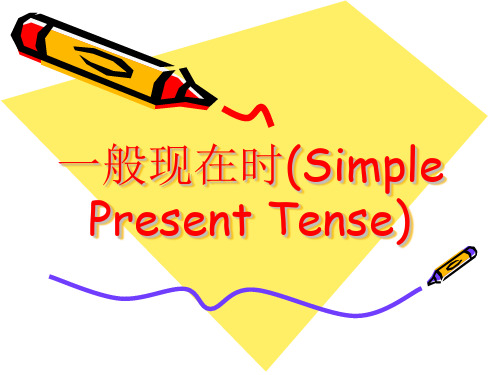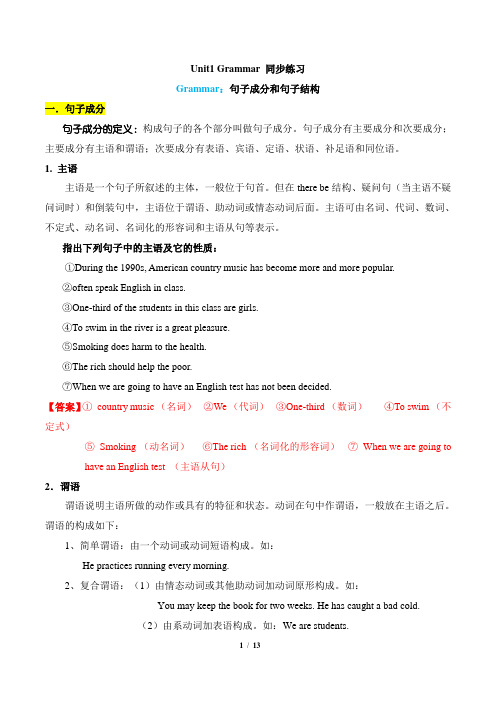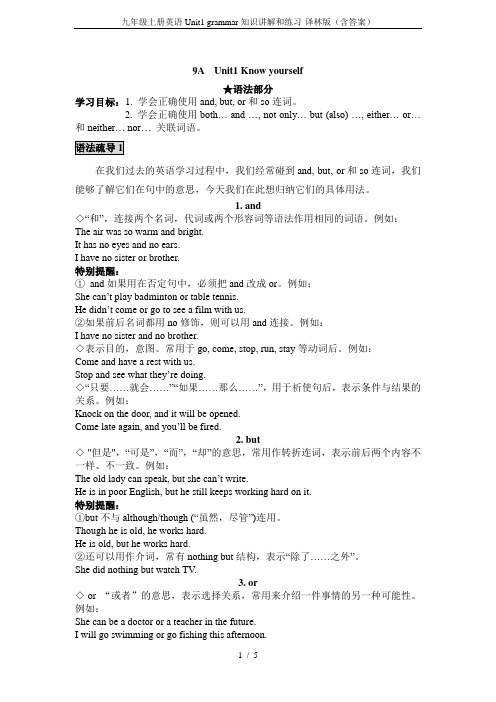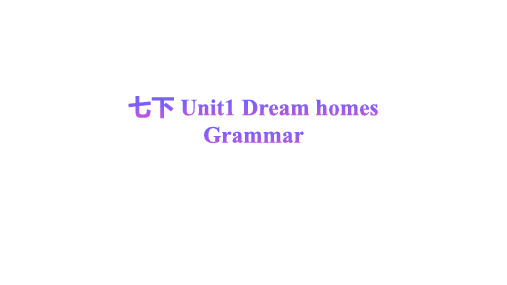grammer unit1
八年级英语下册unit1grammar课件

现在完成时 1 表示之前已发生或完成的动作或状态,但它的影响现在还存在; 也可表示持续到现在的动作或状态。 2 其构成: have (has) +过去分词。 3 规则变化的过去分词与过去式的变化一样,在动词词尾加ed; 不规则变化的过去分词见不规则动词表,需要同学记忆。 现以see the film为例将现在完成时的肯定句, 否定句和疑问句 列表如下: 肯定句:I/You/We/They have seen the film. He/She /It has seen the film. 否定句:I/You/We/They have not/ haven’t seen the film. He/ She/It has not/hasn’t seen the film. 疑问句:Have I/you/they seen the film? Yes, you/ we/I/they have. No, you/ we/I/they haven’t. Has he/she/it seen the film? Yes, he/ she/ it has. No, he/ she/ it hasn’t.
Make up sentences
1 do one’s homework
Have/has+ done done
2 study in Nanzha
3 read English 4 have lunch 5 buy a CD 6 mop up the floor 7 visit the nature reserve
ห้องสมุดไป่ตู้
改错:
1.I have meet Mr Green yet. 2.Tom have just telled a story. 3.We have heared the talk already. 4.Have your father bought a new car? 5.He has just drink some milk. 6.Have you lunch yet? 7.Jill has went to Dalian three times. 8They have planted 20 trees just now. 9.When have you see the film? Just now. 10.They haven’t been to Guangdong already. 11.The police has return already.
新课标人教版必修一 Unit1 Grammar

Step 2: Deal with 课本P5 Ex2
1. Anne said (that) she didn’t know the address of her new home. 2. Anne told her father (that) she had got tired of looking at nature through dirty curtains and dusty windows. 3. The girl said that she needed to pack up her things in the suitcase very quickly. 4. His father asked her why she had chosen her diary and old letters. 5. Mother said to her : “ Are you very hot with so many clothes on ?” 6. “What else did you hide under your overcoat ?” Margot asked her. 7. “When shall we go back ?” Anne asked her father. 8. “ Why did you talk so much to this boy ?” Father asked Anne.
2012-12-12
2. She suffered from loneliness, but she had to learn to like it there. 她遭受孤独的折磨,但是她得学会喜欢呆在那里。 suffer vt. 遭受;忍受;经历,后面常接pain, defeat, loss, poverty, hunger等名词。 vi.受痛苦,患病。常用suffer from结构。 ① Iraq suffered serious damage from the war. 伊拉克因战争而遭受了严重的破坏。 ② He is suffering from cancer. 他患上了癌症。 3. How can Linda recover from her illness in this room ? 琳达在这个房间里怎么能够从病中康复呢……? recover vi.& vt. 痊愈;恢复;重新获得,常与介词from 连用。 ① I think he will recover from her bad cold soon. 我想不久他的重感冒会好的。 ②Jane recovered her lost wallet. 简找到了丢失的钱包。
七年级上册英语课件 Unit 1 Grammar

3.My name is Kitty. 否定句: My name isn’t Kitty. Is your name Kitty? Yes,I am . No,I’m not .
一般疑问句: 肯定回答:
否定回答:
4.Millie is in Class 1,Grade 7.
否定句:Millie is not/isn’t in Class1, Grade7. 一般疑问句: Is Millie in Class1, Grade7? 肯定回答: 否定回答: Yes, she is. No, she is not./she isn’t.
四.按要求改写下列句子:
1.His cousin is good at swimming. (改成否定句)
His cousin isn’t good at swimming.
2.Those boys are from England.(改为一般疑问句并 做否定回答) Are those boys from England? No, they aren’t. 3.I am your friend.(改为一般疑问句并做否定回答) Are you my friend?
Unit1 Grammar 一般现在时

否定句: 主语+don't+动词原形+其他 (变否定句给动词原形前加don't) 1. My parents give ten yuan to my sister every week. (改为否定句) My parents don’t give ten yuan to my sister every week. 2. We usually go to school by bus.(改为否定句) We usually don’t go to school by bus.
一般疑问句: Does+主语+动词原形+其他(句 首加上Does,动词单三变原形,句末变问号) 1. My father gives ten yuan to my sister every week. (改为一般疑问句并作肯定回答) Does your father give ten yuan to your sister every week? Yes, he does. 2. He usually goes to school by bus.(改为一般疑问
play---plays rain---rains see---sees
2. 以 sh,ch,s,x或o结尾的词后加es
wash---washes teach---teaches fix---fixes do---does go---goes
3.以辅音字母加y结尾的, 先把y 变成i,再加es.如: study---studies fly---flies carry---carries
一般现在时(Simple Present Tense)
一般现在时表示的意义:
1、表示现阶段经常反复发生的动作、存 在的状态或习惯性的动作。 2、表示客观真理或事实
译林版高一英语必修第一册(2019版)_Unit1_Grammar_同步练习

Unit1 Grammar 同步练习Grammar:句子成分和句子结构一.句子成分句子成分的定义:构成句子的各个部分叫做句子成分。
句子成分有主要成分和次要成分;主要成分有主语和谓语;次要成分有表语、宾语、定语、状语、补足语和同位语。
1. 主语主语是一个句子所叙述的主体,一般位于句首。
但在there be结构、疑问句(当主语不疑问词时)和倒装句中,主语位于谓语、助动词或情态动词后面。
主语可由名词、代词、数词、不定式、动名词、名词化的形容词和主语从句等表示。
指出下列句子中的主语及它的性质:①During the 1990s, American country music has become more and more popular.②often speak English in class.③One-third of the students in this class are girls.④To swim in the river is a great pleasure.⑤Smoking does harm to the health.⑥The rich should help the poor.⑦When we are going to have an English test has not been decided.【答案】①country music (名词)②We (代词)③One-third (数词)④To swim (不定式)⑤Smoking (动名词)⑥The rich (名词化的形容词)⑦When we are going tohave an English test (主语从句)2.谓语谓语说明主语所做的动作或具有的特征和状态。
动词在句中作谓语,一般放在主语之后。
谓语的构成如下:1、简单谓语:由一个动词或动词短语构成。
如:He practices running every morning.2、复合谓语:(1)由情态动词或其他助动词加动词原形构成。
九年级上册英语Unit1 grammar知识讲解和练习-译林版(含答案)

9A Unit1 Know yourself★语法部分学习目标:1. 学会正确使用and, but, or和so连词。
2. 学会正确使用both… and …, not only… but (also) …, either… or…和neither… nor… 关联词语。
在我们过去的英语学习过程中,我们经常碰到and, but, or和so连词,我们能够了解它们在句中的意思,今天我们在此想归纳它们的具体用法。
1. and◇“和”,连接两个名词,代词或两个形容词等语法作用相同的词语。
例如:The air was so warm and bright.It has no eyes and no ears.I have no sister or brother.特别提醒:①and如果用在否定句中,必须把and改成or。
例如:She can’t play badminton or table tennis.He didn’t come or go to see a film with us.②如果前后名词都用no修饰,则可以用and连接。
例如:I have no sister and no brother.◇表示目的,意图。
常用于go, come, stop, run, stay等动词后。
例如:Come and have a rest with us.Stop and see what they’re doing.◇“只要……就会……”“如果……那么……”,用于祈使句后,表示条件与结果的关系。
例如:Knock on the door, and it will be opened.Come l ate again, and you’ll be fired.2. but◇ "但是",“可是”,“而”,“却”的意思,常用作转折连词,表示前后两个内容不一样、不一致。
例如:The old lady can speak, but she can’t write.He is in poor English, but he still keeps working hard on it.特别提醒:①but不与although/though (“虽然,尽管”)连用。
牛津译林版八年级英语下册unit1 Grammar课件

_现__在__完__成__时___ 则常与just, already, ever, never,just, recently, yet等副词和these days, this week, since ..., for ...等表示一段 时间的时间状语连用。
3. ①He went to Guilin in 1998. 他在1998年去过桂林。
A. living
B. has lived
C. live
D. is going to live
3. "Why _______ she _______ angry?" "Because he _____ at him just now. A. did… get, shouted B. has…got…shouted C. did… get… has shouted D. has…got…has shouted
yet
疑问句/否定句,表示 “已经” 或 “还没有”
Translate the following sentences
1.我们已经完成了家庭作业。 2.他从没参观过北京。 3.你曾经看过这部电影吗? 4.他们刚刚吃了你的食物。 5.他还没有把那本书还给我。 6.最近我读了许多书。 7.自2004年以来我就是一名老师。 8.我在东海居住好多年了。
如何区别现在完成时和一般过去时 1. ①I saw the film yesterday.
我昨天看了那部电影。 ②I have seen the film.
我已经看过那部电影了。 区别一 _一__般__过__去__时__ 的谓语动词用动词的过去 式,而 _现__在__完__成__时___ 的谓语基本构成是 “have / has + 动词的过去分词形式”。
UNIT1GRAMMAR课件牛津译林版七年级英语下册

Rule1: 个位数和十位数之间有连接符。
0
2 109 (one hundred and n1 ine) 145 (one hundred and forty-five) 1082 (one thousand and eighty-two)
Rule2: 读三位或三位以上的数词时,要在十位前加 “and”,如果十位为0,则在个位前加“and”。
Page 28
No.28 Shangwuneihuan Road
10 yuan
Read the cardinal numbers
0 zero 1 one 2 two
+teen /'ti:n/ 11 eleven 12 twelve
3 three
13
4 four
14
5
five 15 Failure is like a thief
Let’s see the rules!
3 654 (six hundred and fifty-four) 4,311 (four thousand three hundred and eleven)
Rule3: 百位以上位数不因变复数而加s。
4 9,425,286
million thousand
and
twenty-five (百万与千之间用逗号隔开)
Let’s read more
1,923,867 22,405
one million nine hundred and twenty-three thousand eight hundred and sixty-seven
twenty-two thousand four hundred and five
1 square mile=2,600,000 square metres
